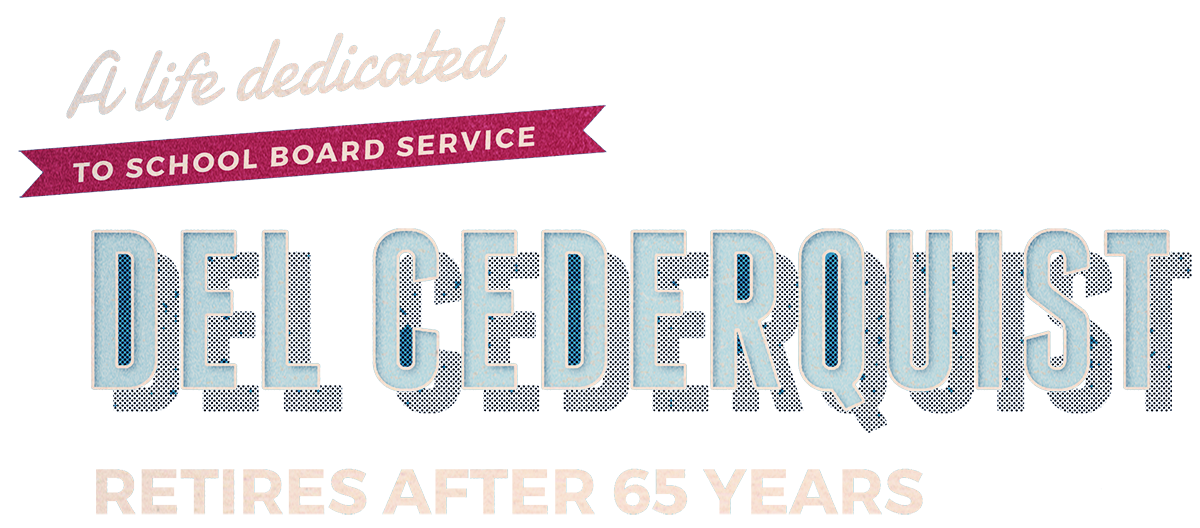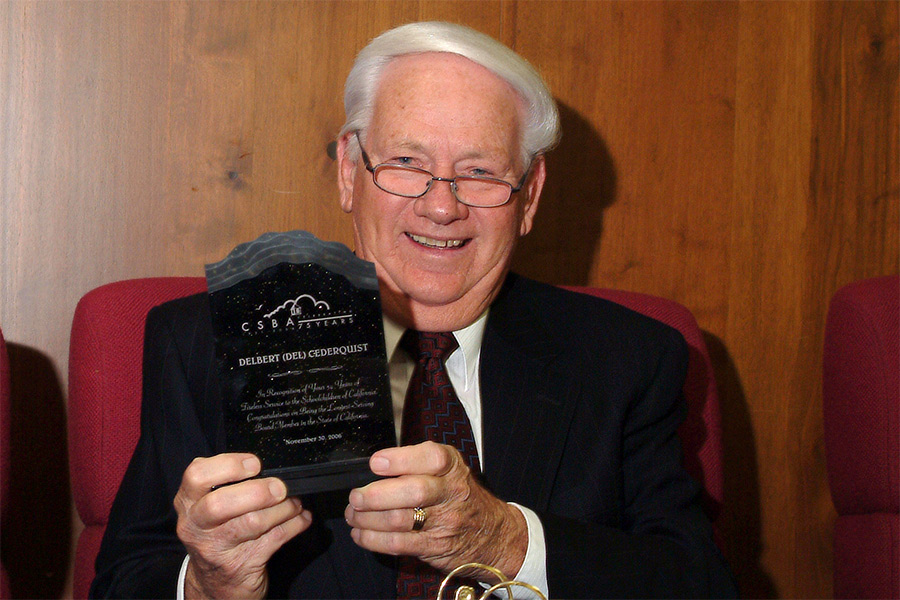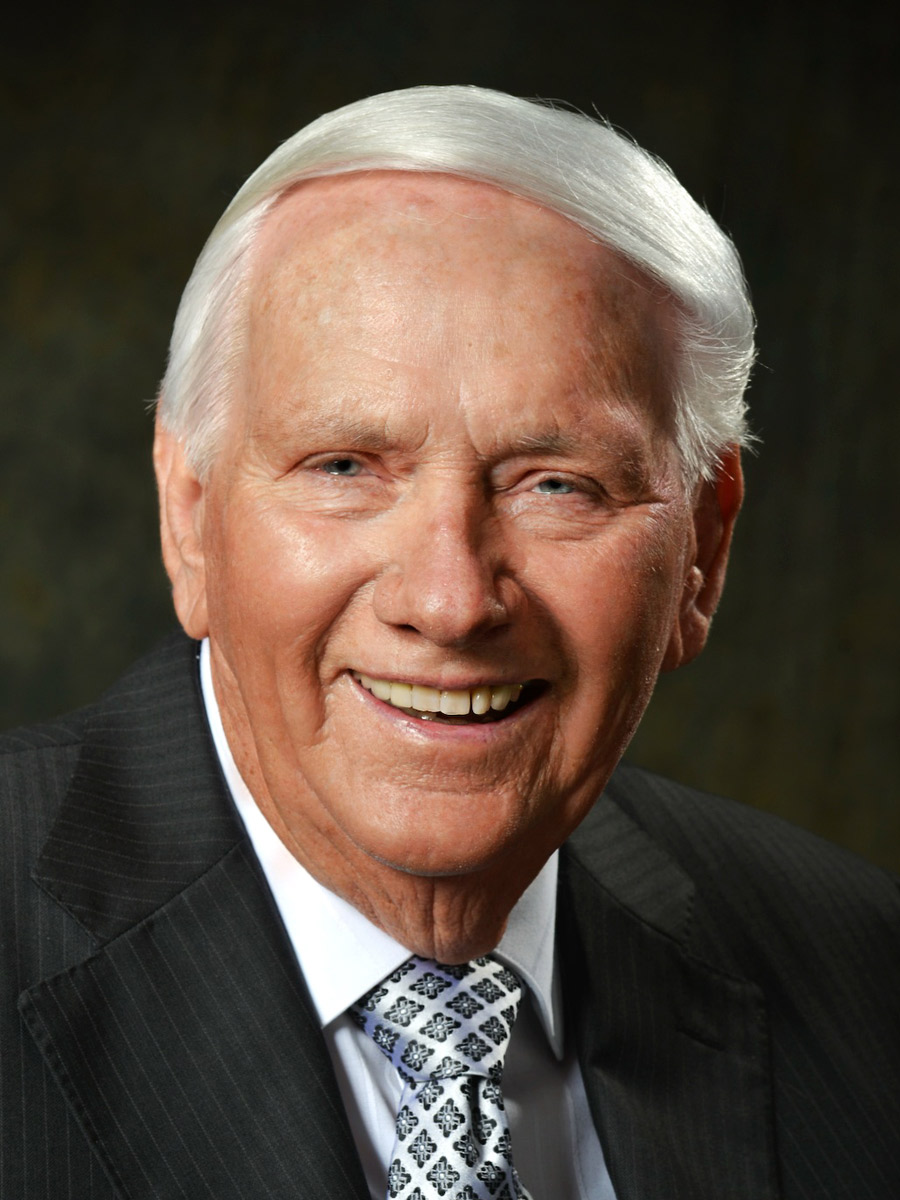
This December, Delbert Cederquist, fondly known as Del, is retiring from California school board service after 65 years, making him the longest-serving school board member in the nation and, most likely, the world. He has been a member of the California School Boards Association since 1967.
Born in 1932, Cederquist grew up attending a two-room elementary school in a rural area south of Fresno, Calif. In 1953, at the age of 21, he ran and was elected to his first school board, joining the board of trustees for the University Colony School District. In 1958, University Colony became the Pacific Union School District, where he served until 1992.
Since 1994, Cederquist has served as a trustee for Area 3 on the Fresno County Office of Education board. The county office of education has oversight over more than 190,000 students and 32 school districts throughout Fresno County.

This December, Delbert Cederquist, fondly known as Del, is retiring from California school board service after 65 years, making him the longest-serving school board member in the nation and, most likely, the world. He has been a member of the California School Boards Association since 1967.
Born in 1932, Cederquist grew up attending a two-room elementary school in a rural area south of Fresno, Calif. In 1953, at the age of 21, he ran and was elected to his first school board, joining the board of trustees for the University Colony School District. In 1958, University Colony became the Pacific Union School District, where he served until 1992.
Since 1994, Cederquist has served as a trustee for Area 3 on the Fresno County Office of Education board. The county office of education has oversight over more than 190,000 students and 32 school districts throughout Fresno County.
Cederquist represents Coalinga-Huron Joint Unified School District, Fowler Unified School District, Kings Canyon Unified School District, Laton Unified School District, Parlier Unified School District, Riverdale Joint Unified School District, Sanger Unified School District and Selma Unified School District, as well as Caruthers Unified School District, Kingsburg Joint Union High School District, Washington Union High School District and their feeder schools.
Currently president of the county board, Cederquist has worked to help Fresno COE realize both its vision and potential, and believes that providing a quality education for all students must be the focus and primary objective of a board member. He has expanded his work beyond Fresno with his many years of service in CSBA, including as a member of CSBA’s Board of Directors, the Delegate Assembly and several committees, as well as leading CSBA as president in 1977. He extended that leadership nationwide as chair of the National School Board Association Pacific Region in 1976. Cederquist has been recognized by many for his sustained impact on education by mentoring school board members with his consistent, positive attitude.
His dedication to the students, teachers and schools of the Central Valley is without parallel. Education has been his lifelong passion and due to his extensive experience and dedication, he is widely recognized for his knowledge, expertise and commitment. Last September, the Fresno COE Foundation honored Cederquist for his dedication to advancing education with the Academia award at its annual gala.
Del and his wife, Denise, still live on the ranch where he was born. In retirement, he plans to continue growing a variety of grapes and spend more time with his family.
Q&A with Del Cederquist
When and why did you first decide to run to become a school board member?
Back in February of 1953, two members of the community, one who was a board member, caught me out in the field and asked me to run for the school board. I’ve been here in the community all my life.
At that time, I had one son and I was concerned that the little rural school district we were in — the University Colony Elementary School District — was starting to grow and it didn’t look like it had much of a future at that time.
How many school boards have you served on and what are they?
As I mentioned above, University Colony was the first one. Then in 1958 there were two other elementary districts, Oleander school district and Bowles school district, contiguous to us that were in the same situation — older and outdated. We convinced those boards that we should combine the three districts. In 1959, we put the package together to build a new school site for a newly formed district, but there was an interesting situation. The school board that I was on had a bonded debt of $13,000 on a room they had added on. The other districts had no bonded debt. If we leveled the bond across the district, there was no additional cost to the other two districts, but unfortunately we weren’t successful in getting that message across. So we went back with another election and did a better job of explaining it. The district had a large Armenian population in agriculture and we even wrote the proposal in Armenian and successfully passed it.

I essentially served on two boards [Union Colony and the newly formed district] for two years while we built the new processes and building for the new district, the Pacific Union School District. I served on that board until 1992, and then I became a board member of the Fresno County Board of Education, which is where I am now.
What do you consider your board’s best victories over the years?
Seeing the Pacific Union School District come to fruition was a major one. We put together a single-site school district that was K-8. None of the three school districts had kindergarten at the time, so that was nice to bring to the community. This was a total rural area with no community center to speak of — so it was very hard for districts to give up their individual school sites and it took some time for people to feel at home in the new district, but they did.
What has changed about the way school boards govern over your tenure?
When I first came on the board we were really about local control. We set our own tax rates in those days. You were totally accountable to the people you were serving in that district. Then along came Proposition 13, which I was not opposed to — it was brought about by the Legislature not doing their job, so it had to happen. But Proposition 13 delivered the money to Sacramento and from there it was doled out, and from that point on it was a different situation. I think that was the biggest change — I saw a deterioration in control at the district level and some of the decisions because of the way the money was dealt out from the state Department of Finance.
What has been one of the biggest challenges you have faced as a school board member?
We didn’t really have any challenges we weren’t able to meet those years on the elementary school district board. You had small obstacles, but in general, there was no crisis. Going on the county board there are challenges that had a lot to do with the board hearing the appeal of students that are expelled from schools in the county. The parent has the right to challenge the expulsion and our duty is to see that the child had due process. Some of those are very challenging. You had to learn to separate your feelings and look at if the child did get due process at their district of origin, and it they did, your duty is to uphold the expulsion. But we had a few we did reject where the district had failed to give a child their due process.
Some other challenges had to do with expanding property for the county office and for future school sites for the court system schools and special education students. That was a very different thing for me, dealing with the court systems — very challenging, but very worthwhile, because if you were able to graduate even one student, to me, that was a success. Another challenging and interesting aspect is the county supervision of special education programs for the districts.
Can you tell us about your history with CSBA? What is your favorite memory from your many years of involvement with CSBA?
I became a member with CSBA in 1967 when I was vice president and then president on the Pacific Union board. That got my feet wet in the organization and I could see right away what the need for CSBA was and where it was going — the association was sort of in its infancy then and still developing the services it has to offer. I served as Director of Region 10 until I ran for Vice President of the association in 1975.
I was always interested in what we could do to serve our membership better and I worked hard at that. I even did some volunteering when there wasn’t staff for certain things. I supervised our first couple years of involvement in the National School Boards Federal Relations Network. I took board members to Washington, D.C., to get that off the ground.
We had a situation in the association with the role of the person handling the conference. I stepped up to the plate because I had a very strong feeling that was where the growth of CSBA was going to be. At that time, CSBA held a joint conference each year with the Association of California School Administrators. As I was getting ready to become CSBA President, I took on a challenge to hold our own conference. I felt that we were more of a tagalong those years and I didn’t feel the school board end of it was getting enough recognition or enough of what our members needed. That didn’t happen without some dissent, but we went on to become, what I would say, is the most successful conference being held in the state as far as school organizations.
What advice do you have for new school board members?
The biggest challenge I see today is board members coming on to boards as stepping stones to something else. My advice is that there should be one thing you are thinking of when you run for school board — and that’s helping the children. That has always been my goal. I always said, if the fire went out in my belly, I was going to walk away. And that fire has not gone out — it still hasn’t gone out, but if I were to run again at 86, I would be 91 at the end of that term, and I don’t think anyone in their right mind would do that. I still have the eagerness and the fortitude to look ahead and see what value CSBA has and I couldn’t be a stronger supporter. I think I have literally known every executive director of CSBA, and I know we are in the greatest hands ever with Vernon Billy. I am so proud of what he has done and what he is doing with the organization in keeping it on track to meet the needs of school board members across the state and the nation. CSBA was very rewarding and I have a very soft spot for the association for all they have done.
Kimberly Sellery is managing editor for California Schools.
